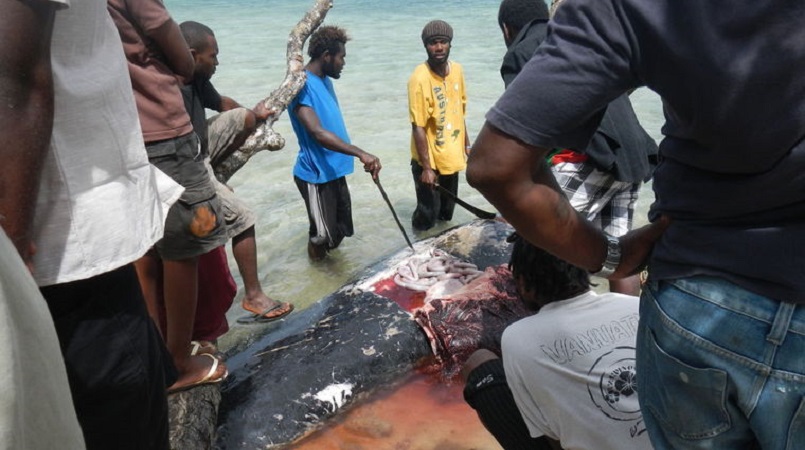
A pilot whale, stranded at Eratap lagoon was found dead Sunday early morning.
Fisheries Department was not aware of the whale until a day later when the Department was alerted of the dead whale at Eratap village, South East of Efate.
Villagers told Fisheries officers that the whale was first noticed in the lagoon Friday last week, then Saturday but on Sunday morning the villagers saw it floating and towed the carcass ashore.
“Upon arrival at the scene, the whale was discovered with its head, tail, dorsal fins and both flippers already removed from the body leaving the trunk lying on the beach,” stated a media release from the Fisheries Department.
After a few hours of investigation, they managed to recover some of the missing parts about 2 miles away from the area.
“The jaws were removed from the head and taken away for the teeth. The whale body length was 6 meters long.
“With help of Dr. Christina Shaw, a Veterinary Surgeon and Conservationist specialized in marine mammal, the whale was identified as pilot whale (Globicephala sp) and was almost a mature adult.”
The Fisheries Department had dissected the carcass for further examination of stomach content, sex and lung.
According to the examination the Department revealed that the internal part of the carcass was still fresh indicating it was alive the day before and only died recently.
“The stomach was almost empty with a few squids suggesting hunger as the cause of its death and there was no froth in the lung indicating it is unlikely that it drowned.
“Other internal organs appeared completely normal. There was no fishing gear or anything else entangling it and abrasions on the body from dragging on the ref ashore by fishermen. All samples were kept at Fisheries Department premises for further analysis by marine mammal scientist.”
Pilot whale is a medium size whale species with lifespan of 45 years and adult weighs 1,000 to 3,000kg and maximum length of 6 meters. Eratap is a very shallow lagoon with mangroves and seagrass. Vanuatu is a marine mammal sanctuary under the Vanuatu Fisheries Act No 10 of 2014.
Under the Act a person must not kill, harm, harass, take or move a marine mammal in the Vanuatu marine mammal sanctuary. Further a person must not import or export any marine mammal parts or products whale parts have in possession of any parts of whales for the purpose of commercial gain. Fisheries Department continue to investigate those involved in dismembering the mammal carcass.
